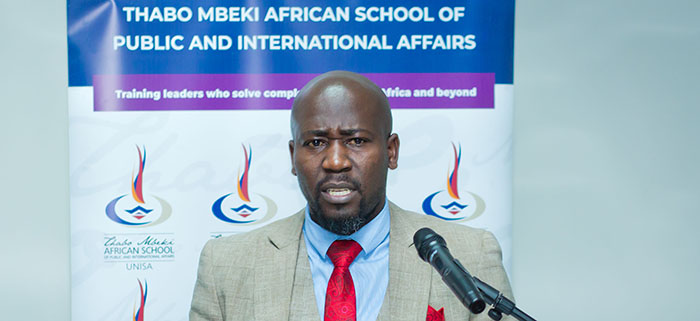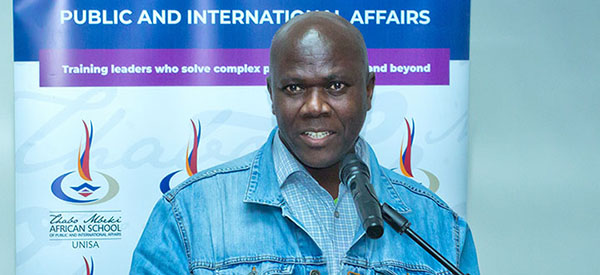

Dr Luke Mupingashato
On 2 August 2025, the Thabo Mbeki African School of Public and International Affairs (TM-School) at Unisa hosted a thought-provoking postdoctoral seminar titled Trade Misinvoicing, Institutions, and Financial Systems: Unveiling Hidden Drains on African Growth. The seminar was led by Dr Tafadzwa Luke Mupingashato, a postdoctoral research fellow at the school, and brought together distinguished scholars and policymakers to critically assess the regional impact of trade misinvoicing in Africa’s mineral sectors.
The seminar formed part of a broader academic engagement series that aims to strengthen the policy relevance of postdoctoral research at the school. In this session, Mupingashato presented findings from his PhD research, focusing on three interlinked essays. His presentation explored the prevalence and mechanisms of trade misinvoicing in Southern Africa’s mineral-rich economies, the role of institutional quality and financial systems, and the broader implications for growth and sustainable development.
His econometric analysis, based on data from UN COMTRADE and institutional indicators across 19 African countries, revealed that illicit financial flows through under-invoicing of exports and over-invoicing of imports exceed USD 2 billion over the past two decades in several SADC countries. Minerals such as gold, platinum and diamonds were particularly affected.
In summarising the findings, Mupingashato noted that countries with underdeveloped financial systems and weak institutional control experience the most severe misinvoicing losses. "This is not just an accounting problem," he stressed. "Trade misinvoicing suppresses tax revenue, weakens state capacity, and undermines public investment. In effect, it cripples Africa’s ability to grow."
He further highlighted that simply improving financial development is insufficient – strong institutions must work in tandem to produce meaningful deterrence. His research supports a "tax suppression hypothesis", which posits that trade misinvoicing reduces fiscal space, constrains social spending and perpetuates inequality.
Two leading commentators, Dr Eliphas Ndou and Prof Patrick Bond, responded to the presentation.
Ndou, currently a lecturer in the Department of Economics at Unisa and a former research economist at the South African Reserve Bank, praised the analytical depth of the research and underscored the urgency of institutional reform. Drawing on his central banking experience, he noted that "without transparent governance frameworks and regional alignment, Africa’s mineral wealth will continue to slip through the cracks".

Dr Eliphas Ndou
Bond, Distinguished Professor of Sociology and a renowned political economist, brought a critical perspective rooted in political economy. He emphasised the historical continuities between colonial extraction and today’s financialised illicit trade. "This is economic sabotage dressed in trade statistics," Bond argued. "We must break the structural dependency on raw commodity exports and confront capital flight head-on."
A central theme of the seminar was the importance of translating research into actionable policy. Mupingashato emphasised the need for cross-sector collaboration across academia, finance ministries, civil society and regional blocs such as SADC and the African Union.
"Regional cooperation is non-negotiable," he said. "The AfCFTA, Agenda 2063, and SDG financing all demand clean, transparent trade systems underpinned by accountable institutions."
The seminar concluded with reflections on the broader policy significance of the research. The findings offer a regional blueprint for tackling illicit financial flows, especially in mineral-exporting African economies. Participants expressed support for developing capacity-building initiatives, real-time customs monitoring systems and improved inter-agency data sharing.
The event was attended by postgraduate students, economic researchers, Unisa staff and members of the diplomatic and policy community. It reaffirmed the TM-School’s role as a critical hub for advancing African solutions to African challenges.
* By Dr Tafadzwa Luke Mupingashato, Postdoctoral Fellow, Thabo Mbeki African School of Public and International Affairs
Publish date: 2025-08-27 00:00:00.0